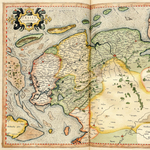'Geen Fries spot met zijn land'. Nationalisme, ironie en het Oera Linda-boek
DOI:
https://doi.org/10.18352/bmgn-lchr.5712Keywords:
Nationalism, ImageAbstract
Irony, nationalism, and the Oera Linda book
The Oera Linda book is a curious enigma which came to light in the Dutch town of Den Helder in 1867. It is an ambiguous literary text which can be read in two different ways: On the one hand as a nonsensical parody on the tradition of Friesian fantastic historiography, and on the other as a much more serious allegory of the nineteenth-century conflict between liberal theological modernism and orthodoxy. The attribution of this anonymous text to the Minister/ Poet François HaverSchmidt (1835-1894) subsequently shows how an ironic style of thinking and writing can be a by-product of modernisation. In the case of HaverSchmidt and his Oera Linda book, this irony is working in two spheres, viz. that of regional identity and that of religion. In both cases, HaverSchmidt's irony is the result of a strongly felt tension between tradition and modernity, between the desire to believe in a fantastic, non-critical nationalist historiography or in the existence of a wonder-working God on the one hand, and on the other a commitment to the knowledge that such things can no longer exist in a modern world.
Downloads

Downloads
Published
Issue
Section
License
Authors who publish with this journal agree to the following terms:
a) Authors retain copyright and grant the journal right of first publication with the work simultaneously licensed under a Creative Commons Attribution 4.0 International (CC BY 4.0) that allows others to share the work with an acknowledgement of the work's authorship and initial publication in this journal.
b) Authors are able to enter into separate, additional contractual arrangements for the non-exclusive distribution of the journal's published version of the work (e.g., post it to an institutional repository or publish it in a book), with an acknowledgement of its initial publication in this journal.
c) Authors are permitted to post their work online (e.g., in institutional repositories or on their website) prior to and during the submission process.
Authors are explicitly encouraged to deposit their published article in their institutional repository.











